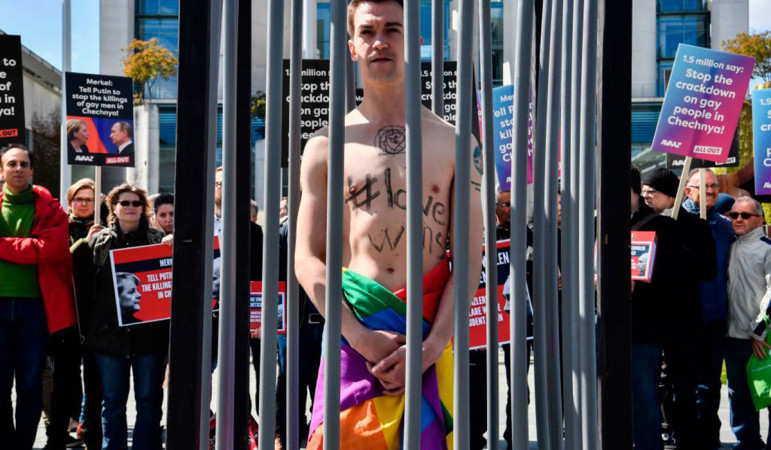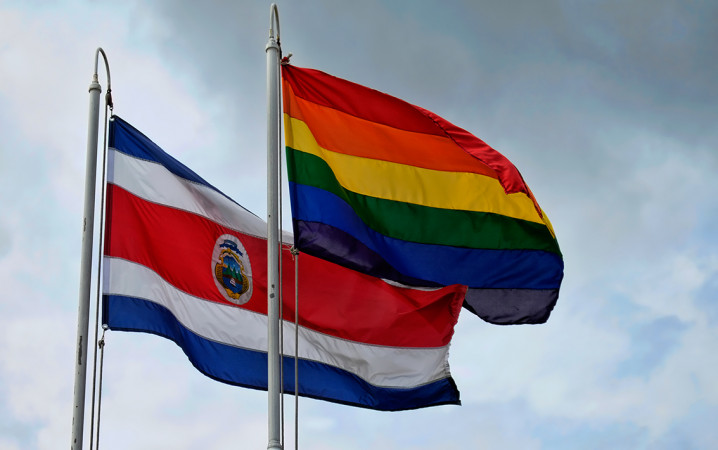The Rights of LGBTQI+ Workers in Azerbaijan and Georgia
Queer Work Environment: The Rights of LGBTQI+ Workers in Azerbaijan and Georgia
16/Dec/24
4672
Queer Work Environment: The Rights of LGBTQI+ Workers in Azerbaijan and Georgia
Author: Nilufar Afandiyeva
In a previous article, I discussed the experiences of queer women in workplaces in Azerbaijan and the effectiveness of the existing legal mechanisms in the country. In this article, I will make acomparison to see how different the work environment is for queer citizens in Georgia, which is considered the most progressive country in the South Caucasus.
To conduct a more detailed study on the state of LGBTQI+ rights between Azerbaijan and Georgia, it is necessary to analyse the legal and political frameworks, progress in human rights protection, obstacles, and statistics in both countries. Based on the 2024 “Rainbow Map” visual report prepared by ILGA-Europe, a comparative analysis of the social security, rights, and freedoms of queer citizens in these two countries shows that Azerbaijan ranks 47th, while Georgia ranks 36th. The key factors contributing to these rankings were identified as follows:
Scope of Legislation on Discrimination and Hate Crimes: In Georgia, the "Anti-Discrimination Law," adopted in 2014, explicitly covers sexual orientation and gender identity. This law prohibits discrimination in all areas and ensures the protection of the rights of citizens who face discrimination. Additionally, this law applies to all areas unless another legal act regulating the actions of state bodies, organisations, and individuals aligns with the second and third clauses of the law's second article. This means that in some cases, if differential treatment (behaviour that may appear discriminatory) is necessary to protect society and serve the purposes of the law, it can be legally justified. Therefore, except for these cases, any differential treatment is considered direct discrimination.
In Azerbaijan's national legislation, the prohibition of discrimination based on gender identity and sexual orientation is not explicitly defined. However, discrimination based on gender identity and sexual orientation is prohibited in international human rights documents ratified as part of the legislation.
Furthermore, amendments made to Georgia's Criminal Code in 2012 provide for the punishment of hate-motivated crimes. Since 2012, crimes committed due to intolerance based on sexual orientation or gender identity are recognised as aggravating circumstances. According to a memorandum prepared in 2020, Georgia's Ministry of Internal Affairs, Prosecutor General's Office, and Supreme Court, together with the National Statistics Agency, annually prepare unified data and reports on hate-motivated crimes. These reports are updated annually and can be accessed on the website of Georgia's National Statistics Agency.
In Azerbaijan, however, the absence of legislation on hate crimes makes it impossible to find any statistical data on this issue. This further complicates the investigation of hate-motivated crimes and weakens access to justice for queer citizens subjected to violence.
"These changes hinder the country's integration into Europe"
Nevertheless, the legal changes in Georgia do not make the public and work environment sufficiently safe and fair for queer citizens. Lawyer Ana Kvantirishvili notes that discrimination based on race, skin color, language, ethnic or social status, nationality, residence, age, gender, sexual orientation, family status, disability, religion, political or other views, as well as affiliation with trade unions or other organisations, is unacceptable when it comes to employment relationships, including the job announcement, and the selection phase.
"The draft law, passed by a majority vote in the first reading in Parliament, did not fully change the legal system due to some pre-existing gaps but had a significant impact on the political process. We had discussions about joining the European Union. The law on 'Family Values and the Protection of Minors' contradicts the obligations of integration, as these obligations are based on the principle of protecting equality. Therefore, in addition to the damage caused to human rights and democracy, this change hinders the country's European integration. As a result, EU representatives have suspended talks on this issue," adds the lawyer.
According to a report by the UN Independent Expert on discrimination based on sexual orientation and gender identity in Georgia, workplace discrimination poses particular challenges for LGBTQI+ employees. Trans women are especially affected. The problem of legal gender recognition creates significant barriers for trans people in working in appropriate conditions, resulting in the emergence of informal and dangerous work environments. Some of them (mainly trans women) engage in sex work for pay, which sometimes puts them in even more vulnerable situations. According to the same report, 61.4% of trans sex workers cited difficult economic conditions as the main reason for their engagement in this work. When assessing the challenges of sex work, respondents mentioned stress related to unstable income (79.5%) and the existing risks to life or health (77.3%). Additionally, 28.2% of lesbian and bisexual women respondents reported facing discrimination based on sexual orientation in the workplace. In most cases, this behaviour was encountered during the hiring process and sometimes during the creation of equal opportunities with other colleagues and during promotions. The article highlights that discrimination occurs more frequently in the private sector (32.6%).
Based on a quantitative study published in 2020 titled "Social Isolation of LGBTQI+ in Georgia," queer citizens reported having less access to the labour market compared to other social groups. They not only face difficulties in workplaces but are often not adequately evaluated during the hiring process. As a result, many of them work in lower-paying jobs or sometimes in dangerous and harmful work environments to meet their financial needs.
It is important to note that decent work should include not only adequate pay and fair distribution of labour but also the provision of a safe work environment. Therefore, it is crucial for queers to have a homophobia-free and healthy work environment, so they do not have to exert additional efforts to limit themselves or hide their identities. In the reality of Georgia, queer youth often have to choose between education and employment due to social crises and the high poverty rate in the country. This choice usually faces young community members who are deprived of financial support from their families. As a result, young people are drawn into dangerous jobs instead of pursuing education, leading them into a "Queer Precarity" cycle from which they rarely find an escape.
"Queer precarity" refers to the increasing vulnerability and instability often faced by LGBTQI+s due to social discrimination, economic marginalisation, and lack of legal protection. This can manifest in various forms, such as job insecurity, housing instability, and limited access to healthcare, which are further exacerbated by systemic biases and exclusionary practices. Additionally, queers face social isolation and violence, deepening their precarious situations. The concept encompasses the intersection of queer identities with broader structural inequalities, highlighting the need for more inclusive and equitable social policies.
On September 29, 2020, as a result of the reform applied to labor legislation, Georgia's Labor Code was more closely aligned with the European Union's directives and the requirements of the International Labour Organization. Consequently, amendments to the Labour Code expanded the concept of discrimination, covering equal access to all professional directions, professional development, vocational education, retraining opportunities, and all levels of the professional hierarchy. These changes further strengthened the powers of the Labour Inspectorate by defining it as a law enforcement body. However, the mandate of the Labour Inspectorate should be limited to general regulation of equality at work, and a mechanism for reporting individual discrimination claims to the Ombudsperson should be implemented.
Although Azerbaijan's legislation does not explicitly define discrimination based on sexual orientation and gender identity, Article 2.0.5 of the Law on Ensuring Gender Equality (between men and women) of the Republic of Azerbaijan is the only law that identifies and prohibits immoral behaviour in labour or service relations that humiliates and insults a person based on gender or sexual orientation. Such behavior is identified as sexual harassment and is prohibited under that law (Article 4). Additionally, according to the requirements of Article 7 of the law, employers must ensure gender equality in labor activities and take necessary measures to prevent discrimination and sexual harassment based on gender.
What Reforms Are Needed?
In conclusion, there are significant differences in the protection of the rights of queer citizens in both countries. Due to the gaps in Azerbaijan's legislation, legal mechanisms are not sufficiently effective in protecting the violated rights of queer citizens. In comparison, the legal reforms carried out in Georgia in 2012 and 2014 have made it easier for queer citizens to access justice, especially regarding discrimination, harassment, and other issues faced in the workplace. However, the "Family Values and Protection of Minors" law, passed in the first reading, could significantly impact many areas of social life, including work. Employers may face limitations in creating inclusive policies and providing support for transgender and non-binary employees. The law could hinder the creation of gender-neutral environments, provision of inclusive health benefits, and the establishment of supportive work environments, negatively affecting the overall work experience and safety of LGBTQI+ employees.
Looking at the case of Azerbaijan, it is evident that serious legal and political reforms are needed. This should start with the explicit identification and prohibition of discrimination based on sexual orientation and gender identity, as well as extending these regulations to pre-employment relationships, as seen in the Georgian example. This would ensure a fair environment and selection not only in workplaces but also during the hiring process and even in the job search phase. Additionally, cooperation between state institutions is crucial for collecting data on incidents of harassment and discrimination. Once the problem's statistical indicator is determined, more productive efforts can be made to solve it.
Powered by Froala Editor



